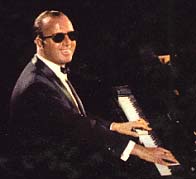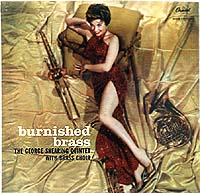Home · Listener's Guide · The Songs · Who's Who · Liner Notes · Selected Tracks · What's New · Search

George Shearing
- Born 13 August 1919, London, England
 Blind from birth, George Shearing has parlayed a "locked
hands" style of playing he learned from Milt Buckner into a long and successful career. He began recording in his late teens, coming to
the United States after the war with the help of Leonard Feather. He
was an active member of the New York jazz club scene in the late
1940s--his song about one of the more famous clubs, "Lullaby of
Birdland," has since become a jazz standard.
Blind from birth, George Shearing has parlayed a "locked
hands" style of playing he learned from Milt Buckner into a long and successful career. He began recording in his late teens, coming to
the United States after the war with the help of Leonard Feather. He
was an active member of the New York jazz club scene in the late
1940s--his song about one of the more famous clubs, "Lullaby of
Birdland," has since become a jazz standard.
Although respected and sought-after by mainstream jazz musicians, he picked up an international hit in 1949 with his cover of "September in the Rain," and made a conscious choice to forego pure jazz for popular success. "Lennie Tristano would never be happy compromising as I'm doing," he has said. Starting on MGM, he switched to Capitol in 1953, and stayed there until choosing to concentrate on small group work in the early 1970s.
 For exotica lovers, Shearing's work on Capitol is of primary interest. Although decidedly easy on the ears, particularly in his string albums, Shearing was not entirely complacent during this era. He was an active proponent of Latin
music, and his Latin Escapade was the first commercially successful
Latin jazz LP. He preferred to emphasize the Latin element in his
live performances, working with the congolero Armando Peraza, as in
his appearance in the film, "Jazz on a Summer Day." Usually low-keyed
and mellow, he could also swing hard, and never took himself too
seriously. For some collectors, though, it's the covers of his
Capitol LPs, many featuring beautiful women in fancy seductive
settings, that are the main attraction.
For exotica lovers, Shearing's work on Capitol is of primary interest. Although decidedly easy on the ears, particularly in his string albums, Shearing was not entirely complacent during this era. He was an active proponent of Latin
music, and his Latin Escapade was the first commercially successful
Latin jazz LP. He preferred to emphasize the Latin element in his
live performances, working with the congolero Armando Peraza, as in
his appearance in the film, "Jazz on a Summer Day." Usually low-keyed
and mellow, he could also swing hard, and never took himself too
seriously. For some collectors, though, it's the covers of his
Capitol LPs, many featuring beautiful women in fancy seductive
settings, that are the main attraction.
Since the late 1970s, Shearing has recorded for Concord Jazz, focusing on jazz rather than popular music.
Recordings
- By Request, London LL-1343
- An Evening with George Shearing, MGM E-3122
- A Shearing Caravan, MGM E-3175
- You're Hearing George Shearing, MGM E-3216
- When Lights Are Low, MGM E-3264
- Touch Of Genius, MGM E-3265
- I Hear Music, MGM E-3266
- Shearing in Hi-Fi, MGM E-3293
- Soft And Silky, MGM SE-4042
- George Shearing & The Montgomery Brothers, Jazzland JLP-955
- The Shearing Spell (with orchestra), Capitol T-648
- Velvet Carpet (with orchestra), Capitol D-720
- Latin Escapade (quintet), Capitol DT-737
- Black Satin (with orchestra), Capitol T-858
- The Shearing Piano (with orchestra), Capitol T-909
- Night Mist (with orchestra), Capitol T-943
- In the Night (with orchestra), Capitol T-1003
- Burnished Brass (quintet with brass choir), Capitol T-1038
- Latin Lace (quintet), Capitol T-1082
- Blue Chiffon, Capitol ST-1124
- Shearing on Stage!, Capitol ST-1187
- Beauty & The Beat!, with Peggy Lee Capitol ST-1219
- Latin Affair, Capitol ST-1275
- Satin Brass, Capitol ST-1326
- White Satin, Capitol ST-1334
- On The Sunny Side Of The Strip, Capitol ST-1416
- The Shearing Touch, Capitol ST-1472
- The Swingin's Mutual ( with Nancy Wilson), Capitol ST-1524
- Mood Latino, Capitol ST-1567
- Satin Affair (quintet), Capitol ST-1628
- San Francisco Scene, Capitol ST-1715
- Concerto for My Love, Capitol ST-1755
- Jazz Moments, Capitol ST-1827
- Shearing Bossa Nova, Capitol ST-1873
- Touch Me Softly, Capitol ST-1874
- Old Gold and Ivory, Capitol ST-2048
- The Best of, Capitol ST-2104
- Deep Velvet (with orchestra), Capitol ST-2143
- Out Of The Woods, Capitol ST-2272
- Latin Rendezvous, Capitol ST-2326
- Here and Now! (quintet), Capitol ST-2372
- Rare Form, Capitol ST-2447
- That Fresh Feeling, Capitol ST 2567
- New Look!, Capitol ST-2637
- Shearing Today, Capitol ST-2699
S p a c e A g e P o p M u s i c
Home · Listener's Guide · The Songs · Who's Who · Liner Notes · Selected Tracks · What's New · Search
Email: editor@spaceagepop.com